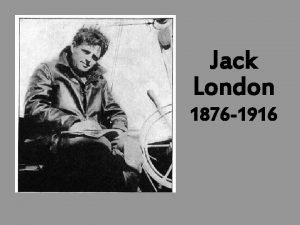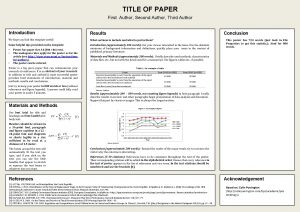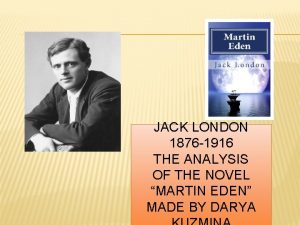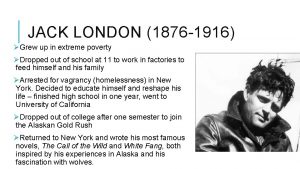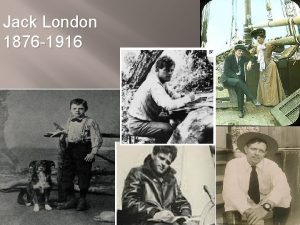Jack London 1876 1916 Author Jack London 1876













- Slides: 13


Jack London (1876 -1916) • Author: Jack London • 1876 -1916 Bay Area Native…born in SF. • First American writer to become a millionaire • 1897 took off to prospect for Yukon Territory in northwestern Canada • His own adventures in the frozen area were the basis for many of his own stories


General Information • The unnamed protagonist is presented a being too confident and often unaware of his own “frailty” • As the harshness of nature surrounds him, he becomes more aware about the folly of this thinking

General Information • Setting • The action takes place in Alaska as an unnamed man tries to make his way along the Yukon Trail. • The story’s setting is important in that the story unfolds during a time of extreme cold: the story describes 75 below 0 temperatures and a sun that is seldom seen

Summary and Plot Overview • An unnamed protagonist and his dog ignore advice and make a trek on the Yukon trail in below freezing temperatures • The protagonist, walking at a brisk pace, hopes to meet “the boys” at camp in 4 hours time

Literary Focus • Foreshadowing • London gives subtle clues throughout the narrative pointing to future points of danger in the cold conditions. – Make sure to take mental notes of these subtle warnings! • Symbolism • London intentionally does not tell the reader protagonist’s name: he is symbolic of any man, and any man struggling against forces outside of this control

Literary Focus • Point of View • The 3 rd Person Omniscient narration offers the reader three distinct views: 1. That of an uncaring, unattached observer 2. Insight into the thoughts of the protagonist 3. Insight into the thoughts of his companion, a dog.

Literary Focus • Style: Naturalism and Realism • Naturalism: – Humans were often subjects to natural forces beyond their control – He was strongly influenced by Charles Darwin’s theories of natural selection and survival of the fittest • Realism: – stories were painfully realistic

Themes and Focus • Man’s Insignificance – Nature is unfeeling, unresponsive and will continue to survive long after man died • Nature’s Power – A seemingly skilled, intelligent protagonist quickly finds himself in dire circumstances Keep the image of this tree in your mind as we read the story “To Build a Fire”.

Themes and Focus • Instinct over Reason – As the story progresses the man’s ability to reason becomes of less value than his dog’s ability to rely on its instinct • Natural Selection and the Survival of the Fittest – Man is not made to survive in the elements presented in the story

Character Analysis • The Prospector • Confident to a fault, it is the prospector’s own sense of invulnerability that puts him in dangerous situations • His personality and thoughts alter drastically as his situation worsens

Character Analysis • The Dog • Relies solely on a sense of instinct and survival • The dog is able to detect subtle clues of danger that his master cannot • He is better suited for the cold conditions than his human counterpart
 Gene prentiss
Gene prentiss First author second author third author
First author second author third author Texas constitution of 1876
Texas constitution of 1876 1876 ko uztailaren 21eko legea iruzkina
1876 ko uztailaren 21eko legea iruzkina Mussett v bingle
Mussett v bingle Indian act 1876
Indian act 1876 Who came up with the dewey decimal system
Who came up with the dewey decimal system Indian act 1876
Indian act 1876 Ohp lcd projectors electronic age
Ohp lcd projectors electronic age Fayol 1916
Fayol 1916 Objectives of khilafat movement
Objectives of khilafat movement Dewey 1916
Dewey 1916 Từ cuối năm 1916 đức áo thun
Từ cuối năm 1916 đức áo thun Easter sunday 1916
Easter sunday 1916
